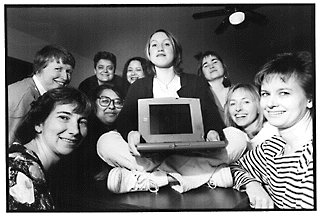https://www.austinchronicle.com/screens/1997-02-07/527352/
Grrowing Grrls
Local Cybergroup Talks Back to Its Mother
By Kayte VanScoy, February 7, 1997, Screens
 Amy Janota, center, surrounded by the Austin Webgrrls' steering committee photograph by Jana Birchum |
The idea behind the International Webgrrls, developed almost two years ago in New York City, is spreading so quickly that it's a wonder founder Aliza Shermann can even keep up. When casual web-surfers such as Amy Janota (Austin's upstart and now fearless Pointgrrl for the local chapter) stumbled upon Shermann's group, they were encouraged to head up their own regional Webgrrls chapters -- which they did. The alliance soon ballooned to an unwieldy 80 chapters around the world -- including active groups in San Francisco, Seattle, and Amsterdam -- all using the Webgrrls name and spunky cartoon character logo on their own websites. Membership has so far been free, and communication with the mother chapter loose. Informal agreements consist only of requested compliance with Shermann's one rule: no boys allowed. Austin members were shocked, then, when Houston's Pointgrrl dropped in on their daily e-mail discussion to announce that Shermann was quietly planning to incorporate her company and turn Webgrrls into a for-profit business. What does that make us, many Austin Grrls wondered, employees? If so, where's my paycheck? These were valid concerns, given the amount of time and work many women have volunteered to establish and advertise the group. As Shermann raced to calm fears, she assured the Austin chapter that she had no intention of profiting from members, but that for-profit status was simply the easiest tax structure available. However, many Grrls are still skeptical of Shermann's motives and have been voicing their opinions online for everyone including their founder to read. In effect, the Webgrrls are involved in a classic labor vs. management dispute whose hierarchy has been equalized by the power of the Internet.
 |
Just when the momentum and excitement surrounding these efforts was beginning to build, however, the controversy about Shermann's for-profit plan broke into the discussion. Shermann, also owner of a New York City-based Web design company called Cybergrrl, plans to charge dues for the local entities to remain chapters, necessitating a membership fee from each new Webgrrl on the list. Many Austin Grrls fear that charging fees will make the group accessible only to seasoned computer pros. "I think the dabblers, the beginners, the community involvement will fall by the wayside," posts Webgrrl Jackie Dana to the listserv debate. Essentially, the spirit of volunteerism and sisterhood which first energized the group's formation seems to have been deflated not only by Shermann's intention to incorporate but by her secrecy as well. Shermann and her supporters defend her plans to reorganize as a necessity and condone her efforts to profit from her own creation. However, many Austin Grrls have called for the local group to recast themselves under a new name, perhaps foreshadowing similar debates in other chapters across the globe.
It is interesting to note that, according to Shermann at least, Austin is the only chapter where this debate is raging. She says that 45 of the 80 chapters have already signed on to become part of her new structure, but there is virtually no way to confirm this without betraying Shermann's trust. That trust is something Austin Webgrrls are valuing less these days than when the group began, however, and several Austin Grrls plan to contact other groups and find out just what they intend to do about Shermann's reorganization. Once contact with other groups has been established, Austin Webgrrls wants to use its new alliances to sway decisions about the direction of Webgrrls from the bottom up. Though no consensus has been reached in the Austin chapter about how to respond to Shermann's for-profit incorporation, it is fairly certain that their response will not be one that Shermann expected.
One member proposed buying Shermann out of her own corporation and relocating the international chapter here in Austin. Others just want to pay her for the rights to use the logo and Webgrrls name and organize the Austin chapter along its own members' guidelines. Some want that organization to be for-profit, some non-profit, and some don't see a need to organize at all, pointing out that the group has come this far without structure. There is not even a consensus as to whether or not to remain an affiliated Webgrrls chapter or split off from the group entirely. Many are fond of their ties to the International group however, citing the benefits of being a part of a world wide network and of name recognition in recruiting new members. There is also the reality that if Austin Webgrrls decides to split off and become an Austin-only group under a new name, someone else is bound to pick up the ball for Shermann. The Austin Grrls plan to post a ballot online for their membership to vote on several of the proposed options.
Most noteworthy, however, is that the Webgrrls have taken for granted that their participation in the decisionmaking process is a right, not a privilege or merely Shermann's indulgence. On the equal playing field of Internet communication, where each voice contributes and competes with the same weight regardless of status, Shermann is only one member of a conversation rather than its leader. "I'm letting it go on like it is a debate, because it can be for us," says Janota.
If they decide, Austin Webgrrls have the luxury of redesigning the group under a new name without losing membership because the Austin listserv is sponsored through local Monsterbit Media, rather than from Shermann's server in New York City, as most other chapters are. Access through Shermann's server has been free, but not for much longer.
Again, Shermann's supporters hail her as a trail-blazing Internet capitalist. "What's wrong with making a profit? We should all be glad when anyone of us women has built a successful, profitable business that helps put women on the Web. We shouldn't shun women who know how to turn a profit, we should learn a thing or two from them," posts Karen Kreps, a professional Web developer and one of the most seasoned Webgrrls, having been in the business since 1987 when she started with Prodigy. But some of Shermann's supporters, Kreps included, harbor doubts about their founder's motives. Ethical quandaries are only compounded by the fact that agreements have been made without the benefit of face-to-face contact. "I'm not totally clear on what Aliza's doing. There's a lot of question about whether she can be trusted," adds a still-skeptical Kreps.
Though Amy Janota realizes that the other Grrls are looking to her for direction, she is not sure where she stands on the incorporation issue. "When I first started, I was very much an Aliza protégé," Janota says, but adds that the new environment of secrecy gives her a "scary, unsupportive feeling." Janota has said that she will not make any agreements with Shermann assuring her status as head of the Austin chapter until the issue of whether to remain Webgrrls or form a new group is decided. Many Webgrrls find the restructuring an exciting opportunity to build a new group, with Webgrrls as a reference point. As Webgrrl Virginia DeBolt optimistically suggests: "If Webgrrls isn't what we wanted, let's make something that is." The Austin Webgrrls dispute does, however, promise to offer a preview of the kind of debates taking place all across the Internet as the marvel of global communication evolves into the drive to discover how to profit off the new medium. As Shermann is forced to take input from the 250 women of the Austin chapter, a new way of doing and creating business is being born, evidenced by the fact that the opinions of Webgrrls underlings are being considered in profit-making decisions. Five, or even two, years ago the resolutions of a company's founder would have been untouchable and absolute. Whether or not profit potential will change the direction of Webgrrls remains to be seen, but there's no doubt that the group has achieved its aim, to give more women the feeling that they have a stake in the future of the Internet.
Visit the Austin Webgrrls at http://www.amy.com/webgrrls or call them in realspace at 444-1672.
Copyright © 2024 Austin Chronicle Corporation. All rights reserved.
